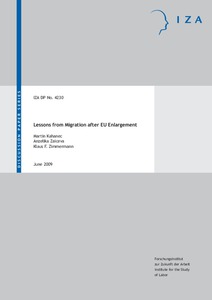Lessons from migration after EU enlargement

Kahanec, Martin ; Zaiceva, Anzelika ; Zimmermann, Klaus F.
Institute of Labor Economics, Bonn
IZA - Bonn
2009
42 p.
economic recession ; EU enlargement ; migration policy ; statistics
EU countries ; new EU countries
Discussion Paper Series
4230
Migration
English
Bibliogr.
"The Eastern enlargement of the EU was an institutional impetus to the migration potential in Europe. While the overall numbers of migrants from the new member states in the EU15 increased between 2003 and 2007, this increase was distributed unevenly among countries. The proportion of these migrants in the EU15 remains smaller than that of non-EU27 migrants. The transitory arrangements may have diverted some migrants from the EU8 mainly to Ireland and the UK. Migrants from the EU2 continued to go predominantly to Italy and Spain. To date, there is no evidence that these primarily economic migrants would displace native workers or lower their wages (and even if crowding out happened in certain sectors or occupation, aggregate data suggest that such natives found well-paid jobs elsewhere), or that they would be more dependent on welfare than the natives. The drain of mainly young and skilled people could pose some additional demographic challenges on the source countries. However, the anticipated brain circulation may in fact help to solve their demographic and economic problems. While the ongoing economic crisis may change the momentum of several migration trajectories, free migration should in fact alleviate many consequences of the crisis and generally improve the allocative efficiency of EU labor markets. "
Digital
The ETUI is co-funded by the European Union. Views and opinions expressed are however those of the author(s) only and do not necessarily reflect those of the European Union or the ETUI.